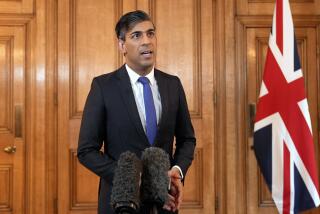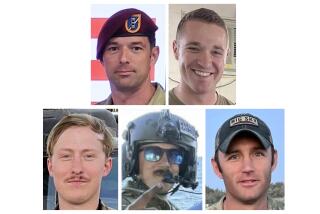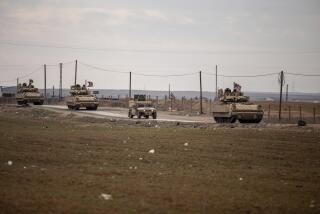August was deadliest month for American troops in Afghanistan
- Share via
Reporting from New Delhi — Sixty-seven U.S. troops died last month in the Afghanistan war, nearly half of them killed when the Taliban shot down a Chinook helicopter, making August the deadliest month for Americans in the nearly decadelong conflict.
The attack on the helicopter, which took place Aug. 6 in Wardak province, west of the capital, was also the deadliest single event of the war for U.S. forces. The 30 service members who lost their lives in the attack — the majority of them Navy SEALs, including some from the unit responsible for killing Osama bin Laden — were flying in to help Army Rangers under fire.
Previously the most deadly month for American forces in Afghanistan was July 2010, when 65 troops died, according to the independent website icasualties.org, which tracks casualties in Iraq and Afghanistan.
In a sign of the shifting U.S. military emphasis under the Obama administration, August was the first month since the invasion of Iraq in March 2003 during which there were no American fatalities in that campaign, according to the website.
There were no U.S. or coalition casualties in Afghanistan on Thursday, the first day of September, according to initial reports. Eight insurgents died in the southern province of Kandahar when a bomb they were making in a house exploded, regional officials said.
The August deaths bring the number of Americans killed in the Afghan war to 1,755, according to icasualties.org. That compares with 380 for Britain and 157 for Canada, the countries with the next two highest totals.
Aside from the attack on the helicopter, however, August was not a particularly bad month on the ground for U.S. troops, analysts said. This was in part due to the monthlong Muslim holiday of Ramadan, when most insurgents fast during the day, making them less likely to wage attacks.
Insurgents are also aware that the United States and its coalition partners are winding down, although analysts said this can work both ways. It may prompt some fighters to bide their time, knowing the departure will happen anyway, while others may step up attacks in a bid to accelerate the exit or claim credit for driving out Western forces.
In June, President Obama announced that 10,000 U.S. troops would leave this year and an additional 23,000 would leave by next summer, in advance of a 2014 deadline to fully hand over security to the Afghans. This initial phased American withdrawal of slightly more troops than the extra contingent the president ordered to Afghanistan in December 2009, would leave 68,000 U.S. military personnel on the ground.
Obama paid homage to all those killed in Afghanistan and Iraq in a speech this week in Minnesota.
“As our mission transitions from combat to support, Afghans will take responsibility for their own security and the longest war in American history will come to a responsible end,” he said Tuesday in Minneapolis at the American Legion’s national convention. “For our troops and military families who have sacrificed so much, this means relief from an unrelenting decade of operations.”
Roadside bombs continue to be the big killer of foreign troops, accounting for almost 52% of fatalities among them in Afghanistan so far this year, according to icasualties.org. More than half of all coalition deaths each year have been attributed to these deadly devices since insurgents stepped up their use in 2008.
The main ingredient in most of the homemade bombs is a nitrate-based fertilizer produced by a single Pakistani company, Pakarab Fertilizers Ltd., the Associated Press reported, citing U.S. officials.
The company produced enough calcium ammonium nitrate fertilizer legally in 2010 to make 140,000 bombs if it was all converted to weapons. Fertilizer reportedly is smuggled into Afghanistan by militants and their suppliers.
Talks have been underway for 18 months to try to regulate distribution of the Pakistani fertilizer. The discussions have been hampered by strained U.S.-Pakistani relations since the May killing of Bin Laden a few hour’s drive from the capital, Islamabad.
More to Read
Sign up for Essential California
The most important California stories and recommendations in your inbox every morning.
You may occasionally receive promotional content from the Los Angeles Times.










